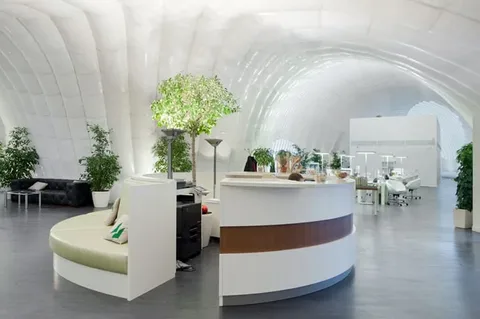Temporary sales office structures have emerged as innovative solutions in the business landscape, especially in industries like real estate, retail, and event management. These structures are typically constructed for a limited duration to facilitate sales operations without the need for a permanent building. This article delves into the significance of temporary sales offices, their key benefits, and challenges, and provides practical tips for effective implementation. (Visit: Temporary Sales Office Structures)
Defining Temporary Sales Office Structures
Temporary sales office structures are pre-fabricated or modular buildings designed for short-term use, usually tailored to specific sales campaigns or promotions. They can range from simple kiosks to more elaborate display offices featuring meeting spaces, design elements, and brand visuals. For more insight into the solutions available for temporary structures, visit Woodpeckers Global.
The primary purpose of these structures is to establish a direct connection between the company and potential customers. They serve as prominent touchpoints in strategic locations, making it easier for businesses to engage with their target audience.
The Significance of Temporary Sales Offices
One of the most noteworthy implications of temporary sales offices is their flexibility. Businesses can deploy these structures in various locations to tap into different markets. Their ability to foster direct engagement with potential buyers means companies can better promote their products or services, drive sales, and generate leads without the hefty investment that comes with permanent office spaces.
Additionally, temporary sales offices allow businesses to adapt quickly to changing market conditions. For instance, if a company identifies a surge in interest in a particular area, it can quickly set up shop to capitalize on this opportunity. The agility of temporary structures can make a significant difference in a highly competitive environment.
Key Benefits of Temporary Sales Office Structures
Cost-Effective Solutions
One of the standout advantages of temporary sales office structures is their cost-effectiveness. Traditional office spaces often involve long-term leases, maintenance costs, and significant renovations. Temporary structures can be set up with much lower financial requirements, enabling companies to invest more resources into marketing and product development rather than fixed overhead costs.
Enhanced Brand Visibility
Temporary sales offices can be designed to align with a brand’s identity, creating unique and engaging customer experiences. For example, Coca-Cola’s pop-up sales offices during major events or festivals are designed to showcase their latest products while amplifying the brand’s presence. These customized structures can utilize branding materials, interactive displays, and unique architectural features that capture attention and draw in potential customers.
Rapid Deployment
Temporary structures are quick to set up and dismantle, allowing businesses to respond swiftly to market opportunities. During real estate launches, for instance, developers often use temporary sales offices to showcase properties in emerging neighborhoods. These structures create an immediate presence that helps prospective buyers visualize their investment before the development is completed.
Real-World Applications
To illustrate the success of temporary sales office structures, consider the example of a tech company launching a new product. By setting up a temporary sales office in a high-traffic area, they can host interactive demonstrations, exhibition booth design offer hands-on experiences, and collect customer data. The immediate feedback obtained can be invaluable for refining future marketing strategies.
Likewise, during outdoor festivals or concerts, food vendors frequently use temporary sales offices to serve customers. These structures can be customized to enhance branding, improve customer experience, and create a unique atmosphere that aligns with the event’s theme.
Challenges and Misconceptions
While there are many benefits associated with temporary sales office structures, some challenges might discourage businesses from exploring this option. Common misconceptions include concerns about compliance and regulations, perceived durability, and the ability to create a professional environment.
Compliance Issues
Some businesses worry that temporary structures may not meet local building codes or zoning laws. To combat this, companies should work closely with construction professionals who specialize in temporary structures to ensure compliance with all regulations.
Quality Concerns
Another misconception surrounding temporary sales offices is that they cannot provide a professional or appealing aesthetic. Advances in design and construction technologies have significantly improved the quality and design potential of these structures. With the right planning and execution, temporary sales offices can be both high-quality and visually stunning.
Implementing Temporary Sales Office Structures
For companies considering the use of temporary sales office structures, several practical steps can lead to successful implementation.
Conduct Market Research
Before setting up a temporary office, assess the target demographic and their preferences. Understanding your audience can guide the design and location of the structure.
Choose the Right Location
High foot traffic areas are ideal for temporary sales offices. Consider locations near shopping centers, large events, or popular urban areas to maximize visibility and attract potential customers.
Design for Engagement
Ensure the temporary sales office reflects your brand identity. Use attention-grabbing signage, interactive elements, and comfortable spaces to enhance visitor engagement.
Plan for Logistics
Consider logistics such as power and sanitation needs, staffing requirements, and technology for customer interaction. Planning these factors ahead of time ensures smooth operations.
In Conclusion
Temporary sales office structures present businesses with flexible, cost-effective solutions that foster customer engagement and enhance brand visibility. While there may be challenges and misconceptions surrounding their use, understanding the benefits and strategically implementing them can lead to great success. Embrace the opportunity to utilize temporary sales offices as part of your business strategy, and see how they can transform your marketing efforts.


